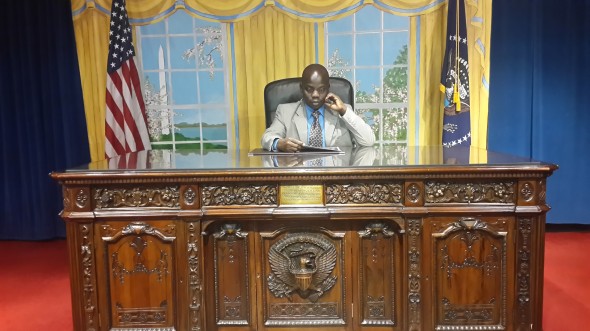 Striking a presidential pose at the White House Souvenir gift shop in November 2014
Striking a presidential pose at the White House Souvenir gift shop in November 2014
My leadership style is pragmatic in approach and based on values: Merit, result-oriented and honesty. I believe a person who stands for nothing falls for everything.
At school, I variously served as timekeeper, Health/Environment prefect, students’ Speaker for my high school and home district as well as secretary-general of the debating club.
As a teenager, I was entrusted with the responsibility to shop for and handle the family’s entertainment. Why? Because I was honest, ably executed my duties, and accountable to self and family. My father imparted in me my early leadership values.
Mumford & Van Doorn, 2001
I work as Chief Reporter (and an alternate News Editor) for the Daily Monitor, Uganda’s second highest-circulating newspaper but largest independent English daily.
I am passionate about mentoring young, up-and-coming Reporters and I help introduce the promising ones to my sources by going out on assignments with them. This way they learn early how to interact with (high profile) sources, interview techniques and public conduct, empowering them to do work on their own.
When editing a copy, I identify and highlight the glitches and send it back to the author to fix. This is because; as Prof. Curtis MacDougall enunciated in his book Interpretative Reporting, a fix-it editor does not help in a Reporter’s growth.
I found similar expressions in the Cy Wakeman’s Reality-Based Leadership book, which I read for my Fall semester leadership assignment.
She writes: “It may feel good to play the benevolent boss or indispensable colleague, but trying to perfect people’s circumstances is not the way to do it, because people gain nothing from being managed that way…your competence, which has brought you so far, will become their excuse not to progress.”
This isn’t an election manifesto. I am alive to my weaknesses of impatience with slow learners. I hate intrigue and tend to keep aloof from people I have reservations about, showing judging instead of helping.
Many people know me to be headstrong and assertive even when a good listener.
At work, I seek to understand staff beyond official presentation, hold over-coffee-or-dinner meet ups outside office and regularly personally keep with them in times of personal adversity.
This has helped break communication barriers, many colleagues confide in or seek guidance from me and I continue to help in personal and professional situations to engender overall growth.
The last batch of student intern at the Daily Monitor, whose placement I oversaw, have remained so connected with me online in appreciation of their enriching experience at the newspaper through a structured arrangement. It is what I learned while working at The Times of London where I in 2008 worked for 3 months as a David Astor fellow.
I took up the Humphrey fellowship, and forfeited the UK government’s Chevening scholarship, in order to improve my skills. When I advance, my ability to help or influence others increases for the betterment of all of us. The learning wheel keeps rolling.

This is dealing with reality. The word pragmatic is defined as “dealing with things sensibly and realistically in a way that is based on practical rather than theoretical considerations.”
I prefer this approach because every situation is different and requires one or combination of different leadership styles in time. Some times I am more effective influencing from behind the scenes, and other times, I take solid front line lead.
That’s how I have been able to balance my community, family and work responsibilities as Chief Reporter, husband, uncle, son and friend.
The writer is a 2014/15 Hubert H. Humphrey fellow

